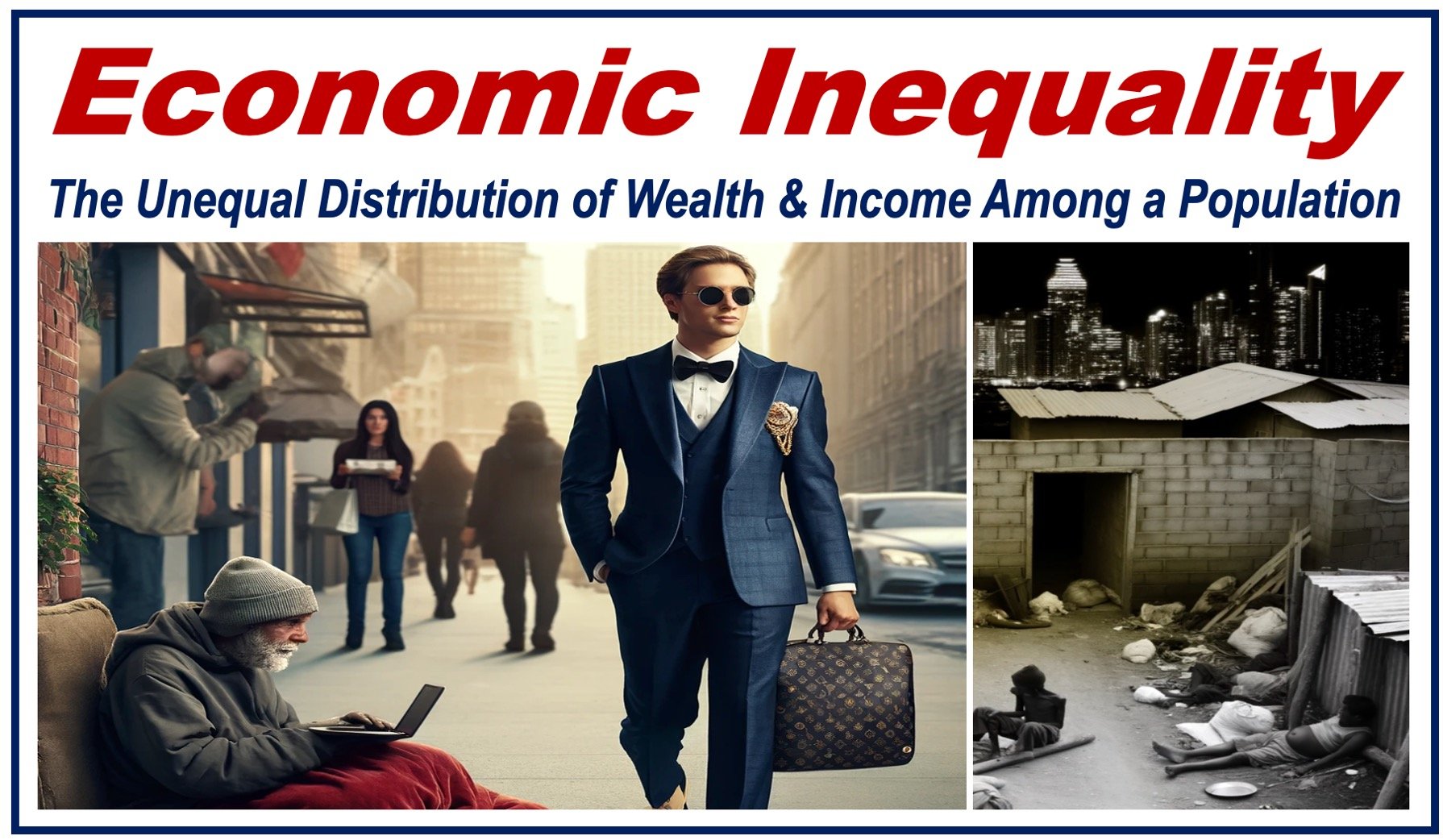If there is a large gap between the richest and poorest people in a society, we say there is Economic Inequality. This gap exists all over the world, between countries and within them.
Put simply, economic inequality means that some people have much more money, possessions, and opportunities than others.
The terms wealth gap, income gap, income inequality, and wealth inequality are similar to economic inequality.
The American Psychological Association says the following about the term “economic inequality”:
“Economic inequality is the unequal distribution of income and opportunity between different groups in society. There are wide varieties of economic inequality, most notably income inequality measured using the distribution of income (the amount of money people are paid) and wealth inequality measured using the distribution of wealth (the amount of wealth people own).”
Why Does Economic Inequality Matter?
Economic inequality is an increasingly popular topic. It is a complex issue with many causes and effects. Here is why it is important to understand:
-
Unfairness
In many people’s opinion, the fact that some people are born into wealth while others face a lifetime of hardship and lack of opportunity simply due to their circumstances is unfair.
-
Social problems
When the wealth gap is large, there is a greater risk of social problems such as crime, poorer health outcomes, educational disparities, environmental degradation, and deteriorating social trust.
-
Economic Hardship
For people at the bottom of the socioeconomic ladder, having limited resources and scant opportunities can lead to difficulties affording essentials like housing, food, education, and healthcare.
-
Limits Potential
Inequality limits the potential of individuals born into less fortunate situations. This not only affects people at the individual level but also society and the economy as a whole.

How Do We Measure Economic Inequality?
There are several ways to measure wealth inequality. Here are three of them:
-
Income Inequality
This looks at how much people earn. Is most of the income concentrated in a small percentage of the population?
Image two countries – Country A and Country B. In Country A, 2% of the population earns 50% of total income while in Country B, 6% earn 50%, respectively. Income inequality is greater in Country A.
-
Wealth Inequality
Wealth includes things like property, investments, and savings. Wealth inequality looks at the difference in the value of assets between the richest and poorest people in society.
-
Consumption Inequality
This focuses on how much people are actually able to spend on goods and services.
What Causes Economic Inequality?
As mentioned earlier, inequality is a complex issue with many causes. Let us take a look at four of them:
-
Economic Policies
Government tax plans, labor regulations, and welfare programs (or lack of them) can increase or decrease inequality.
-
Globalization
The increased movement of goods and jobs across borders can put downward pressure on wages for some workers and benefit others. While it may be a cause of inequality in some countries, it has the opposite effect in others.
Some economists argue that globalization has helped reduce inequality between countries by enabling faster economic growth in emerging and developing countries.
-
Technology
Automation and artificial intelligence can replace jobs, potentially leading to income loss for certain groups of workers, such as those in manufacturing, routine office administration, customer service, and transportation sectors.
-
Discrimination
Research indicates that discrimination based on race, gender, religion, or social background not only exacerbates existing inequalities but, in some cases, may also be a primary cause of them.
What Can We Do About It?
Economic inequality and what can and should be done about it is a controversial subject. Some people argue that too much interference in the economy by the government often backfires, leading to a gradual loss of productivity and wealth.
Others say that too much inequality can lead to political and social instability, a greater risk of health problems such as epidemics, and slower economic growth.
Here are some measures that governments can take to reduce inequality:
A tax system that charges a higher percentage of higher earners’ incomes than that of lower earners.
- Labor market regulations
Policies like minimum wage laws, overtime pay requirements, anti-discrimination laws, secure contract enforcement, enhanced worker safety regulations, and the right to collective bargaining can help raise the standard of living of those at or near the bottom of the socioeconomic ladder.
- Education and training
Investing in education and training can equip more people with the skills needed for good, well-paying jobs.
